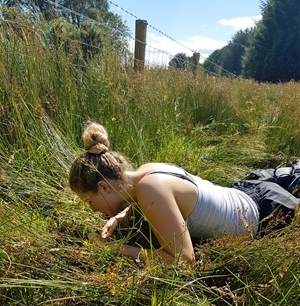IT is well known that liming can improve forage production but the wider effects of liming are poorly understood. A liming research project is underway at GWSDF Auchnerran on Deeside which now incorporates studies being run by both the James Hutton Institute and the Moredun Institute.
The James Hutton’s liming research, also underway on a number of other farms across Scotland, aims to look at the effects of liming on soil chemistry, invertebrate biodiversity and sward composition. The Game & Wildlife Scottish Demonstration Farm (GWSDF Auchnerran), is particularly interested in how liming affects soil invertebrates as these provide a valuable food source for wader species.
The liming of fields is also being used to help with a Moredun Research Institute study into liver fluke infection in grazing livestock. The MRI researchers are interested in whether numbers of mud snails are affected by liming - something that, surprisingly, we don’t know much about. Mud snails are an intermediate host for liver fluke, a highly pathogenic flatworm parasite of grazing livestock. Where fluke is present it will often be found in the snails, although there may be snails present and no fluke.
This work is increasingly relevant as some agri-environment prescriptions promote boggy and wet ground. Some resistance to taking up these options can come from livestock farmers perceiving risks from fluke infection that outweigh the benefits that these habitats can have for wildlife. These studies are a part of a combined package of work to look in more detail at how great those risks may be.
 The research at GWSDF Auchnerran is monitoring two fields with half their area limed and half not limed. GWCT has identified 10 sites (each up to 1metre radius) in each field, five limed and five un-limed. At each of these, a 10 minute search for snails will be conducted up to once a month between April and October when the snails are on the surface. The snails found will be counted and sent to the Moredun where they will be identified to species level and screened for fluke infection.
The research at GWSDF Auchnerran is monitoring two fields with half their area limed and half not limed. GWCT has identified 10 sites (each up to 1metre radius) in each field, five limed and five un-limed. At each of these, a 10 minute search for snails will be conducted up to once a month between April and October when the snails are on the surface. The snails found will be counted and sent to the Moredun where they will be identified to species level and screened for fluke infection.
The first counts are being done now before the lime is applied. GWCT is also conducting a further mud snail survey at a number of other sites as a separate project.
Dr Dave Parish, Head of Scottish Lowland Research, GWCT says: “GWSDF Auchnerran is an ideal location for these projects, not least because we run a 1200 ewe sheep flock there so fluke is a major concern. And our ongoing work with waders is another area of considerable interest, and whether liming can provide a better environment for their breeding success.”
Dr Philip Skuce, Principal Scientist at the Moredun Research Institute, says: “Liver fluke risk is a genuine concern for livestock farmers and we know fluke has been a problem on GWSDF Auchnerran in the past. This collaboration with GWCT and the James Hutton Institute provides a unique opportunity to investigate the actual fluke risk associated with the implementation of agri-environment options and we look forward to working together over the coming weeks and months.”
Photo: Marlies Nicolai, Research Assistant, GWSDF Auchnerran, hunting for mud snails.
Credit: Marlies Nicolai, GWCT
Notes to editors
The Game & Wildlife Conservation Trust is an independent wildlife conservation charity which carries out scientific research into Britain’s game and wildlife. We advise farmers and landowners on improving wildlife habitats. We employ 22 post-doctoral scientists and 50 other research staff with expertise in areas such as birds, insects, mammals, farming, fish and statistics. We undertake our own research as well as projects funded by contract and grant-aid from Government and private bodies. The Trust is also responsible for a number of Government Biodiversity Action Plan species and is lead partner for grey partridge and joint lead partner for brown hare and black grouse.
For information, contact:
Playfair Walker
Telephone: 0131 445 5570
Email: richard@playfairwalker.com